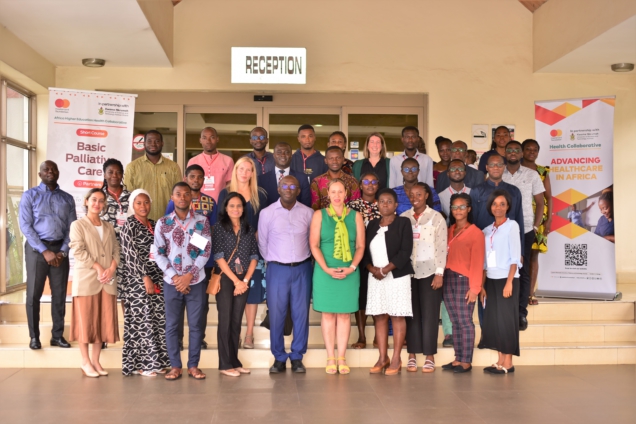In a bid to provide quality healthcare for patients with serious illnesses, such as cancer, the Mastercard Foundation Africa Higher Education Health Collaborative has organised a course in basic palliative healthcare for health personnel.
This course will equip 20 selected health personnel from across the country with the requisite skills to provide specialized medical care for such patients.
The workshop is in partnership with the Kwame Nkrumah University of Science and Technology, University of Toronto and the Ministry of Health.
The programme is under the Health Employment pillar of the Mastercard Foundation Africa Higher Education Health Collaborative.
The Health Employment pillar aims to expand and improve current capacities to train primary healthcare workers.
A facilitator, Prof. Mawuli Gyakobo of the Department of Internal Medicine and Therapeutics, University of Cape Coast, observed some shortfalls in palliative care in the country.
“We also observed some of the misapplication of some opioid drugs across the country, and this was quite disturbing and so we thought that there was a huge gap to be filled if we had to give quality care to our patients across the country.
“The gap is still wide and we have not been able to fill out many of them, “ he said.
Dr. Jennifer Wilson of the Department of Family and Community Medicine at the University of Toronto was optimistic of the positive impact of the training.
“I know that this training is going to be something that is going to impact you, inspire you, equip you so that you can return to help your people,” she said.
The Dean of the KNUST School of Public Health, Prof. Samuel Newton commended the Mastercard Foundation Africa Higher Education Health Collaborative for the initiative.
“We are really grateful, Mastercard has made a big difference in the school of public health and we hope that in these few days we can still do better by learning from the others who have joined us,” he said.
The Africa Higher Education Health Collaborative in partnership with the Mastercard Foundation seeks to advance healthcare in Africa through three pillars: Health Employment, Health Entrepreneurship and Health Ecosystem.
The Health Entrepreneurship pillar aims to develop an entrepreneurial mindset and culture that supports entrepreneurs to create meaningful innovations and employment opportunities in the health sector.
The Health Ecosystem pillar also aims to train and prepare a new generation of talented professionals with the broad sets of skills required to drive equitable and inclusive growth.
Latest Stories
-
Merging struggling entities won’t fix energy sector, timing is crucial – IES boss
32 mins -
AGI promotes socioeconomic growth by nurturing small and micro enterprises
37 mins -
Party leaders urged to encourage supporters to desist from violent acts
39 mins -
Ghanaians urged to refrain from electoral violence
49 mins -
NCCE promotes participatory democracy through dialogue in Lawra
51 mins -
Newmont’s GH¢5.5m Apprenticeship Programme boosts skills of local youth
53 mins -
Newmont’s Foundation commissions new classroom block at Afrisipakrom
2 hours -
GIZ, partners help achieve health resilience through pandemic management projects
2 hours -
Dr Kwesi Eduafo Yankey appointed First Chancellor of Koforidua Technical University
2 hours -
Lights on or off? Institute for Energy Security boss debates NDC and NPP track records
3 hours -
Adolescent parliament in Sunyani wants children’s concerns prioritised
3 hours -
Trump taps loyalists with few qualifications for top jobs
4 hours -
Ugandan Archbishop says Welby split global Anglican communion
4 hours -
Our ‘SSNIT revolution’ will boost healthcare access, help hospitals function better – Nana Kwame Bediako
4 hours -
Violent clash at swearing in of new Ho GPRTU executives
5 hours

